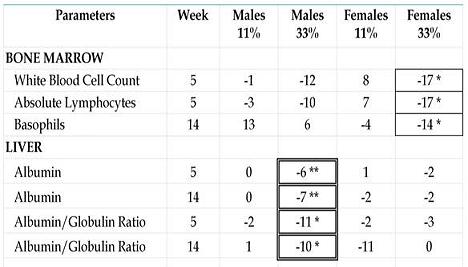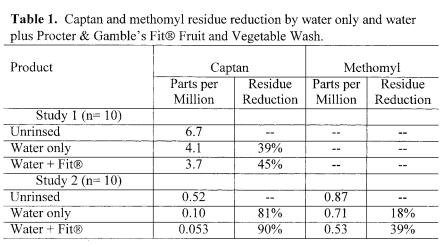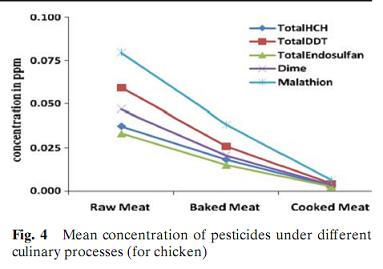January 11, 2010
Is Genetically Modified Food Safe?

uh oh
A recent study on the safety of genetically modified food is important for two reasons:
1. This is the first of its kind (!)
2. This is the longest in vivo study (in animals) on the safety of this food: 90 days. (!!!)
Rats were given one of three strains of genetically modified corn, or a non-GM corn feed, and studied for 90 days.
The results were not encouraging,
For example:

While these are not gigantic results, keep in mind that these are rats are eating at most a 33% mixture of GM corn, and it's only for 90 days. If you want to know if they cause cancer, just check with your kids in a few decades.
II.
It's not obvious to me how eating something with modified DNA is harmful. When you eat DNA, you don't incorporate bits of it into yours, any more than when you eat a pie you incorporate bits of pie.
One corn (NK 603) was modified to be able to withstand the plant killer Roundup, and two others (MON 810 and 863) were modified to produce an insecticide. When you eat this corn, therefore, you are also eating some herbicide or pesticide. In other words, it may not be the GM corn itself that is toxic. If the corn is grown on a farm that is sprayed with Roundup, then you're eating Roundup. It's quite possible this study is measuring the toxicity of Roundup, not GM corn.
Put another way: maybe they should find better ways of washing the corn?
III.
Does washing corn-- or anything-- help remove pesticides?
A.
In one study, water alone was tested vs. Fit Fruit And Vegetable Washing Kit.
 Three points:
Three points:
1. Study 1 fruit had been treated only with captan; Study 2 fruit was treated with a mixture of captan and methomyl.
2. Water and Fit both wash off captan well, but water isn't as good for methomyl, probably because fruits are coated with wax after they have been treated with pesticides, locking in the deliciousness. Water doesn't penetrate wax, but ethanol (in Fit) does-- as does rubbing the fruit. Moral: scrub wash, then peel, then wash your fruit. Soaking them in rum is helpful and delicious but not recommended.
3. This is what they mean by washing: soaking the fruit in 2L of water for 30 seconds, then rinsing it four times, 30 seconds each. Then rinsing again for 5 seconds with 2L fresh more water.
1. This is the first of its kind (!)
2. This is the longest in vivo study (in animals) on the safety of this food: 90 days. (!!!)
Rats were given one of three strains of genetically modified corn, or a non-GM corn feed, and studied for 90 days.
The results were not encouraging,
Our analysis clearly reveals for the 3 GMOs new side effects linked with GM maize consumption, which were sex- and often dose-dependent. Effects were mostly associated with the kidney and liver, the dietary detoxifying organs, although different between the 3 GMOs.
For example:

While these are not gigantic results, keep in mind that these are rats are eating at most a 33% mixture of GM corn, and it's only for 90 days. If you want to know if they cause cancer, just check with your kids in a few decades.
II.
It's not obvious to me how eating something with modified DNA is harmful. When you eat DNA, you don't incorporate bits of it into yours, any more than when you eat a pie you incorporate bits of pie.
One corn (NK 603) was modified to be able to withstand the plant killer Roundup, and two others (MON 810 and 863) were modified to produce an insecticide. When you eat this corn, therefore, you are also eating some herbicide or pesticide. In other words, it may not be the GM corn itself that is toxic. If the corn is grown on a farm that is sprayed with Roundup, then you're eating Roundup. It's quite possible this study is measuring the toxicity of Roundup, not GM corn.
Put another way: maybe they should find better ways of washing the corn?
III.
Does washing corn-- or anything-- help remove pesticides?
A.
In one study, water alone was tested vs. Fit Fruit And Vegetable Washing Kit.
 Three points:
Three points:1. Study 1 fruit had been treated only with captan; Study 2 fruit was treated with a mixture of captan and methomyl.
2. Water and Fit both wash off captan well, but water isn't as good for methomyl, probably because fruits are coated with wax after they have been treated with pesticides, locking in the deliciousness. Water doesn't penetrate wax, but ethanol (in Fit) does-- as does rubbing the fruit. Moral: scrub wash, then peel, then wash your fruit. Soaking them in rum is helpful and delicious but not recommended.
3. This is what they mean by washing: soaking the fruit in 2L of water for 30 seconds, then rinsing it four times, 30 seconds each. Then rinsing again for 5 seconds with 2L fresh more water.
B.
An older study found that water was as good as Fit and even washing in 1% (!) Palmolive, significantly reducing 9/12 pesticides studied. (It had no effect on 3 others, so there's that.)
C.
What about meat?
While many pesticides have been banned (e.g. DDT) they are still in the soil and get incorporated into the plant. In a similar manner, current pesticides are theoretically incorporated into the fat of the farm animals that eat the sprayed plants and feed.
A study done in India found various meats (cow, goat, chicken) to be contaminated with several pesticides, including DDT. None of the animals appeared sick prior to their slaughter. However, and this is the point:
 Cooking means steam (in a pot.)
Cooking means steam (in a pot.)
I'd guess that cooking vegetables probably has the same effect.
---
http://twitter.com/thelastpsych
An older study found that water was as good as Fit and even washing in 1% (!) Palmolive, significantly reducing 9/12 pesticides studied. (It had no effect on 3 others, so there's that.)
C.
What about meat?
While many pesticides have been banned (e.g. DDT) they are still in the soil and get incorporated into the plant. In a similar manner, current pesticides are theoretically incorporated into the fat of the farm animals that eat the sprayed plants and feed.
A study done in India found various meats (cow, goat, chicken) to be contaminated with several pesticides, including DDT. None of the animals appeared sick prior to their slaughter. However, and this is the point:
 Cooking means steam (in a pot.)
Cooking means steam (in a pot.)I'd guess that cooking vegetables probably has the same effect.
---
http://twitter.com/thelastpsych
24 Comments